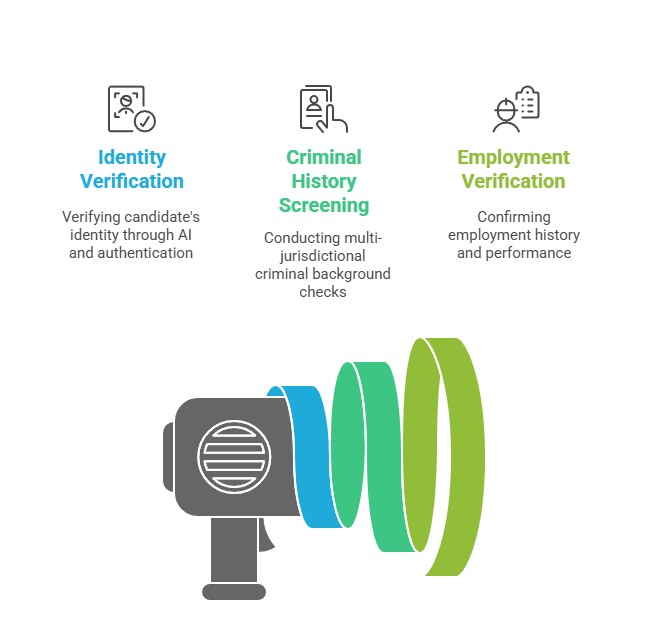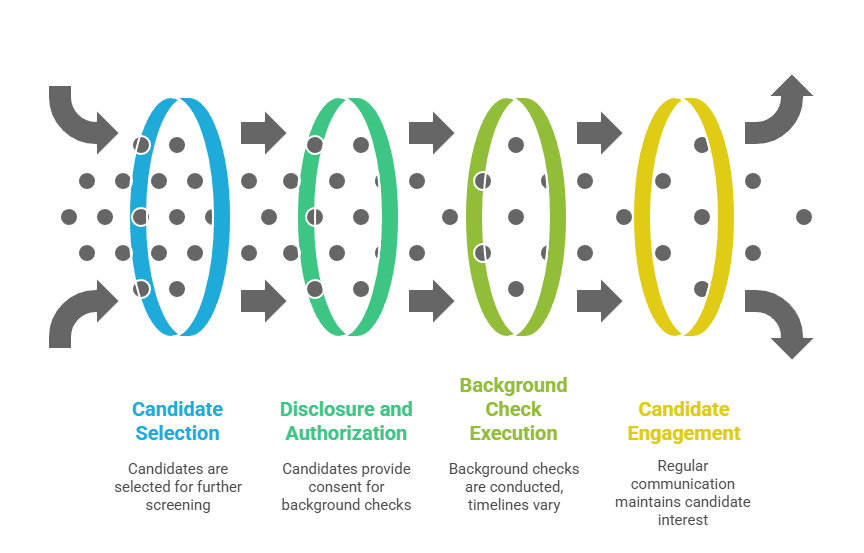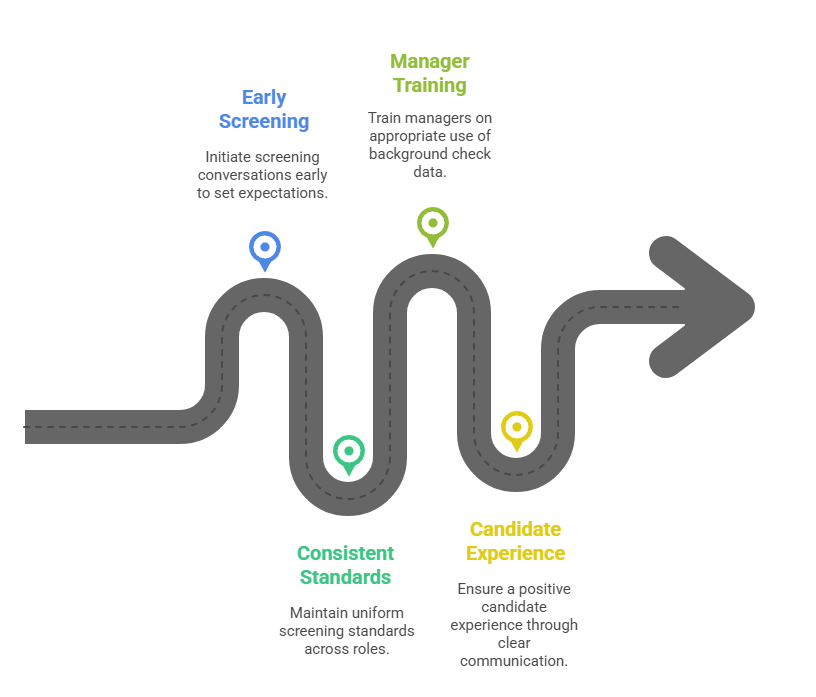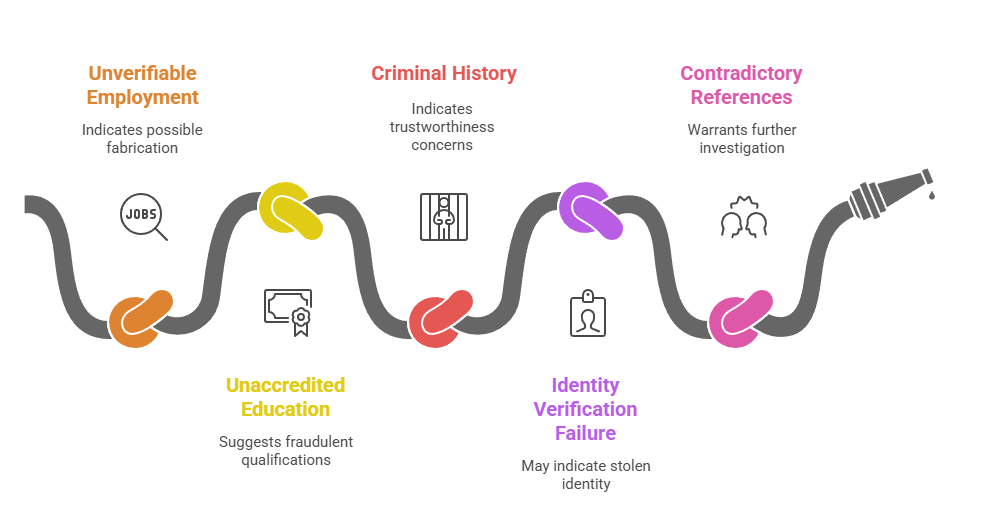Remote startup hiring has transformed how companies build teams, with 73% of startups now maintaining fully distributed or hybrid workforces in 2025. However, conducting thorough remote employee background checks across state lines and international borders introduces complex compliance challenges that require specialized screening strategies, vendor partnerships, and technology platforms to maintain hiring standards while protecting company culture and security.
Key Takeaways
- Remote startup hiring demands standardized background screening processes that work consistently across multiple jurisdictions while maintaining compliance with state-specific laws and international regulations.
- Pre-adverse action procedures and FCRA compliance become more complex with distributed teams, requiring documented communication protocols and extended response timelines for remote candidates.
- Identity verification for remote employees requires enhanced digital authentication methods beyond traditional in-person document checks, including biometric validation and multi-factor identity proofing.
- Startup hiring managers must balance speed-to-hire pressures with thorough vetting, as remote work eliminates casual observation periods that office environments naturally provide for cultural fit assessment.
- Background check costs for remote positions vary significantly by location, with international screening potentially costing 3-5x more than domestic checks due to additional verification layers and country-specific requirements.
- Building trust in distributed workforces starts at the hiring stage, where transparent background screening policies demonstrate organizational integrity and set expectations for remote employee accountability.
The Evolution of Remote Hiring in Startup Culture
The startup ecosystem has undergone a fundamental shift in how companies approach talent acquisition. What began as a pandemic necessity has evolved into a permanent competitive advantage. Remote-first startups now access talent pools previously limited by geography. This democratization of opportunity comes with increased responsibility for hiring managers and HR professionals. They must verify candidates they may never meet face-to-face.
Remote employee background checks now serve as the primary due diligence mechanism. They replace traditional reference checks and in-person interviews that once dominated startup hiring. The informal "coffee chat" culture that startups relied upon has given way to structured remote screening processes. For staffing agencies serving the startup sector, this represents both challenge and opportunity. Those who master distributed workforce verification gain significant market advantages.
The financial stakes have risen considerably. A poor hire in a remote startup environment can cost between $40,000 and $150,000. This figure includes recruitment expenses, training investment, lost productivity, and team morale impacts. Background screening serves as insurance against these costly mistakes. It becomes particularly important when remote work eliminates the natural oversight that physical offices provide.
Understanding the Unique Challenges of Remote Startup Hiring

Remote startup hiring introduces complications absent from traditional employment models. Geographic dispersion means candidates may reside in jurisdictions with varying background check regulations. This creates a patchwork compliance landscape. A startup based in California hiring a developer in Texas and a marketer in New York must navigate three distinct regulatory frameworks simultaneously.
The lack of physical presence amplifies verification challenges. Hiring managers cannot casually verify identity through in-person document inspection. They cannot conduct informal reference checks with mutual acquaintances in shared professional communities. The speed-oriented culture of startups clashes with the thoroughness required for comprehensive background screening. This creates tension between competitive hiring timelines and risk management.
Technology dependence introduces another layer of complexity. While digital platforms enable remote hiring at scale, they also create opportunities for sophisticated identity fraud. They enable credential misrepresentation as well. The National Association of Professional Background Screeners reports a 34% increase in falsified remote work credentials since 2022. Jobseekers recognize reduced verification scrutiny in distributed hiring processes.
EXPERT INSIGHT: The experience of hiring remotely at a startup has taught me that the importance of the hiring of a candidate’s background check is not merely to be compliant but to instill the foundation of trust in people whom we might not personally know. As talent could be sourced from other states, other nations, and other cultures, the approach of the hiring procedure applied to these people has to be thorough and considered: a people-first approach. - Charm Paz, CHRP
Essential Components of Remote Employee Background Checks

Comprehensive background screening for distributed teams requires multiple verification layers that work cohesively. Understanding these components helps hiring managers design appropriate screening protocols. These protocols must match risk profiles of specific roles. Each element serves a distinct purpose in building confidence about remote candidates.
Identity Verification for Remote Candidates
Identity verification forms the foundation of all subsequent background checks. For remote positions, this process must compensate for the inability to inspect original documents in person. Modern identity proofing combines government-issued identification verification with biometric matching. It also includes knowledge-based authentication questions derived from credit header data and public records.
Leading background check providers now employ artificial intelligence to detect fraudulent documents. These systems analyze security features, font consistency, and document templates through micro-analysis. They can identify sophisticated forgeries that might pass visual inspection. This provides startup hiring teams with institutional-grade verification capabilities. Two-factor and multi-factor authentication protocols add additional security layers. They require candidates to verify identity through multiple independent channels before proceeding with employment screening.
Criminal History Screening Across Jurisdictions
Criminal background checks for remote employees present jurisdictional complexity. This complexity is absent from localized hiring. The challenge stems from the decentralized nature of criminal records in the United States. Data resides at county, state, and federal levels. No comprehensive national database exists.
Effective criminal screening for distributed workforces typically includes three components. County criminal searches examine specific courthouse records going back 7-10 years. State criminal repositories provide statewide records from participating courts. Federal criminal searches access federal district court records nationwide. Each level captures different types of offenses and operates on different timelines.
| Screening Level | Coverage | Typical Turnaround |
| County Criminal Search | Specific county courthouse records, 7-10 years | 1-5 business days |
| State Criminal Repository | Statewide records from participating courts | 1-3 business days |
| Federal Criminal Search | Federal district court records nationwide | 1-2 business days |
For remote startup hiring, best practices suggest searching counties where candidates have lived, worked, or attended school during the past seven years. This should be supplemented by statewide and federal searches. This multi-jurisdictional approach costs more and takes longer than single-location screening. However, it provides appropriate coverage for employees who will work without direct supervision.
Employment and Education Verification
Resume fraud has increased in remote hiring contexts. CareerBuilder research indicates 78% of jobseekers admit to misleading statements on applications. For startup hiring managers building teams remotely, verification of employment history and educational credentials becomes essential rather than optional.
Employment verification confirms dates of employment, job titles, and when possible, performance assessments from previous employers. The process has become more challenging as companies have centralized HR functions. Many organizations have limited information released due to litigation concerns. Most now only confirm dates and titles through third-party verification services. This makes reference checks from former supervisors increasingly valuable for substantive performance insights.
FCRA Compliance for Distributed Hiring Teams
The Fair Credit Reporting Act governs employment background checks nationwide. It establishes specific requirements that apply regardless of whether hiring occurs remotely or in traditional settings. However, remote startup hiring introduces practical compliance challenges. These require particular attention from hiring managers and startup owners without dedicated legal teams.
FCRA mandates a specific sequence of disclosures and authorizations before conducting background checks. Employers must provide candidates with a standalone disclosure document. This document explains that a background check will be conducted. It must be separate from job applications or other hiring paperwork. Candidates must provide written authorization before any screening begins. In remote hiring, these documents are typically exchanged electronically. This requires secure platforms that maintain audit trails documenting proper authorization.
The pre-adverse action process becomes more complex with distributed candidates. If background check results may lead to a decision not to hire, employers must provide specific notices. These include a pre-adverse action notice with a copy of the background check report and a summary of FCRA rights. The candidate must receive reasonable time to dispute inaccuracies before a final decision. For remote candidates across multiple time zones, establishing "reasonable time" requires clear documentation. Most compliance experts recommend 5-7 business days minimum.
Building an Effective Remote Background Check Process
Creating a standardized screening workflow ensures consistency while maintaining the hiring speed that startups require. A well-designed process protects companies legally. It also provides candidates with professional experiences that reinforce the employer brand. Structure and transparency matter equally in remote hiring contexts.

The process begins before job posting. At this stage, hiring managers define role-specific screening requirements. Not all positions warrant identical background checks. A remote software engineer accessing proprietary code requires different screening than a content writer with limited system access. This risk-based approach optimizes budget allocation while ensuring appropriate due diligence. Startup owners should document these role classifications. This demonstrates consistent application and helps avoid discrimination claims.
Following candidate selection but before final offers, the background check sequence begins with disclosure and authorization. Clear communication about screening timelines sets appropriate expectations. This is particularly important when competing for talent in competitive startup markets. Most comprehensive background checks for remote employees require 5-10 business days. However, international components may extend timelines to 3-4 weeks. During the screening period, maintaining candidate engagement becomes critical. Regular communication prevents candidate drop-off, especially when competing offers may emerge.
Technology Solutions for Remote Background Screening
The right technology infrastructure transforms background screening from administrative burden to competitive advantage. Modern platforms designed for remote startup hiring integrate with applicant tracking systems. They provide candidate self-service portals and automate compliance workflows. These features reduce legal risk while improving efficiency.
Leading background check platforms offer capabilities specifically valuable for distributed hiring. API integrations create seamless connections with applicant tracking systems. This eliminates duplicate data entry and creates unified candidate records. Mobile-optimized experiences allow candidates to complete authorizations through smartphone apps. This accelerates timelines significantly. Real-time status tracking provides transparency into screening progress. Automated compliance workflows ensure FCRA compliance without manual intervention. International screening capabilities through global verification networks enable consistent screening for borderless remote teams.
For startups with limited budgets, the temptation to use low-cost screening providers can be strong. However, this decision carries significant risk. Substandard providers may deliver incomplete results or operate without proper FCRA compliance. They may lack the international capabilities necessary for truly distributed teams. The $15-25 per check saved becomes irrelevant when a poor hire costs $50,000. A compliance violation can result in substantial regulatory penalties.
International Considerations for Global Remote Teams
As remote startups expand hiring beyond domestic borders, background screening complexity increases exponentially. Each country maintains distinct data privacy regulations, criminal record accessibility, and verification processes. These require specialized knowledge and local partnerships. Understanding these differences prevents costly mistakes and compliance violations.
The European Union's General Data Protection Regulation (GDPR) imposes strict requirements on processing personal data. This includes employment background checks for EU residents. Employers must demonstrate legitimate interest and obtain explicit consent. They must limit data collection to what is strictly necessary for employment decisions. GDPR's "right to be forgotten" and data portability requirements create obligations. These extend beyond the hiring process into ongoing employment records management.
Background check availability varies dramatically by country. Some nations maintain comprehensive criminal databases accessible for employment screening. Others restrict access or prohibit employer use of criminal records entirely. In Germany, criminal record checks can only be requested for specific positions. These involve vulnerable populations. Japan limits employer access to criminal records. This makes alternative verification methods necessary.
| Region | Typical Timeline | Estimated Cost |
| United States | 5-10 business days | $50-150 per candidate |
| European Union | 10-20 business days | $150-300 per candidate |
| Latin America | 15-30 business days | $200-400 per candidate |
| Asia-Pacific | 20-40 business days | $250-500 per candidate |
Working with background screening providers that maintain international partnerships becomes essential. These providers navigate local regulations and maintain relationships with data sources. They understand cultural contexts that affect verification processes.
Cost Considerations and Budget Planning
Background screening represents a necessary investment in risk management. However, costs vary significantly based on scope, geography, and vendor selection. Startup hiring managers must balance thoroughness against budget constraints. They must avoid the false economy of inadequate screening.
Basic background checks typically range from $30-75 per candidate for domestic remote employees. These include criminal history, identity verification, and employment verification. More comprehensive packages cost $75-150. They include education verification, professional license checks, and extended criminal history searches. International screening adds substantial expenses. Costs range from $150-500 per candidate depending on country-specific requirements and data accessibility.
Volume pricing becomes available at scale. Many providers offer discounted rates for startups committing to minimum monthly or annual volumes. However, early-stage companies without predictable hiring volumes may not qualify for these tiers. Staffing agencies often negotiate preferred pricing they can extend to startup clients. This provides cost advantages for companies outsourcing portions of their recruitment function. The opportunity cost of delayed hiring sometimes exceeds direct screening expenses.
Best Practices for Startup Hiring Managers
Experienced hiring managers in the startup ecosystem have developed practical approaches. These balance thorough vetting with the speed and candidate experience that competitive talent markets demand. Following established best practices protects companies while attracting top talent.

- Start screening conversations early in hiring processes rather than surprising candidates with unexpected background checks. Transparency about screening requirements during initial interviews sets appropriate expectations. It identifies potential concerns before significant time investment. This approach respects candidate time while protecting company interests.
- Maintain consistent screening standards across similar roles regardless of hiring urgency. The temptation to shortcut background checks when desperate to fill critical positions creates legal risk. It also undermines organizational integrity.
- Train hiring managers and interviewers on appropriate use of background check information. Criminal records, credit history, and other sensitive information require careful evaluation. Evaluation must consider job-relatedness and individualized assessment. Managers without proper training may make illegal screening decisions.
- Create candidate-friendly experiences throughout screening processes. Clear communication about timelines demonstrates respect for candidates. Responsive answers to questions and transparency about what information is being verified reinforce professionalism.
Red Flags and Warning Signs in Remote Hiring
Certain patterns in background checks and candidate behavior should trigger additional scrutiny. This applies especially when hiring for remote positions. While individual items may have legitimate explanations, combinations of concerns warrant careful evaluation. Recognition of warning signs protects companies from problematic hires.
Gaps in employment history deserve particular attention for remote roles where supervision is limited. Candidates unable or unwilling to explain significant unemployment periods may be concealing problematic terminations. They may be hiding other concerning history. While employment gaps alone don't disqualify candidates, vague or evasive explanations combined with other concerns merit deeper investigation. Legitimate reasons include caregiving, education, health issues, or entrepreneurial ventures.
Inconsistencies between resumes and background check results require resolution before hiring. Discrepancies in dates, job titles, educational credentials, or employer names might indicate honest mistakes. However, they might indicate problematic misrepresentation as well. Conduct follow-up conversations giving candidates opportunities to explain differences. This should occur before making adverse decisions.
These specific verification failures should prompt additional investigation:

- Unverifiable employment history: Multiple employers who cannot be contacted or have no record of the candidate may indicate fabrication.
- Degree mills or unaccredited institutions: Educational credentials from institutions without proper accreditation suggest fraudulent qualifications.
- Criminal records involving fraud or theft: These offenses directly indicate trustworthiness concerns particularly relevant for unsupervised remote work.
- Identity verification failures: Inability to verify identity through standard processes may indicate stolen identity or fraudulent documentation.
- Contradictory references: References providing substantially different accounts of performance or dates warrant additional investigation.
For remote positions with financial responsibilities or access to sensitive data, credit checks may reveal concerning patterns. However, credit history must be evaluated carefully considering fair hiring practices. Ban-the-box legislation in some jurisdictions restricts credit check use.
Building Trust in Distributed Teams Through Transparent Screening
Background screening serves dual purposes in remote startup hiring. It protects companies while simultaneously establishing the foundation for high-trust distributed teams. The transparency and professionalism with which companies conduct screening sets the tone for ongoing remote work relationships.
When candidates understand that all team members have been thoroughly vetted through consistent processes, it creates confidence. This confidence extends to colleague competence and integrity. This assurance becomes particularly valuable in remote environments. Casual observation of colleague behavior is impossible in distributed settings. Knowing that the company takes hiring seriously helps remote employees trust team members they rarely or never meet in person.
Conversely, inconsistent or secretive background screening undermines the trust essential for distributed teams. Employees who discover that some team members faced rigorous screening while others were rushed through minimal verification begin questioning leadership. They question judgment and fairness. This erosion of trust proves particularly damaging in remote contexts. Trust must compensate for lack of physical proximity and direct supervision.
Conclusion
Remote startup hiring has permanently transformed talent acquisition. It offers unprecedented access to global talent pools while introducing complex background screening challenges. Success requires balancing thorough verification with hiring speed. It requires navigating multi-jurisdictional compliance requirements and implementing technology solutions that create positive candidate experiences. Startup hiring managers who master these elements build distributed teams combining security with the trust essential for remote collaboration. As remote work continues evolving, companies that invest in robust, fair, and transparent background screening processes will maintain competitive advantages in attracting and retaining top talent while protecting organizational interests.
Frequently Asked Questions
How long do background checks take for remote employees?
Background checks for remote employees typically require 5-10 business days for comprehensive domestic screening. This includes criminal history, employment verification, and education verification. International background checks take considerably longer, usually 15-40 business days depending on the country. They require navigating foreign data sources, language translation, and varying record accessibility. Expedited services can reduce timelines by 2-3 days for additional fees. However, some verification components like international education verification cannot be meaningfully accelerated. Startup hiring managers should initiate background checks immediately after candidate selection to minimize impact on hiring timelines.
Can you conduct background checks on international remote workers?
Yes, background checks can be conducted on international remote workers. However, the process is more complex and expensive than domestic screening. International background checks require working with screening providers that maintain partnerships with data sources in the candidate's country. These providers must understand local regulations including GDPR and other data protection laws. They must navigate language and cultural differences affecting verification. Costs typically range from $150-500 per candidate depending on country-specific requirements. Timelines extend to 15-40 business days. Some countries severely restrict criminal record access for employment purposes. This requires alternative verification approaches focusing on education, employment history, and professional references.
What types of background checks are necessary for remote startup employees?
Essential background checks for remote startup employees include identity verification and criminal history screening. Criminal screening should cover county, state, and federal levels. Employment verification for the previous 5-7 years is also necessary. Education verification matters for roles requiring specific degrees. Additional screening components depend on role responsibilities. Credit checks apply to positions with financial authority. Professional license verification applies to regulated professions. Reference checks matter for senior leadership roles. Remote positions warrant more thorough screening than office-based roles since physical oversight is absent. Startup hiring managers should implement risk-based screening approaches. Verification depth should match the access, autonomy, and sensitivity of each role rather than applying identical checks universally.
How much do background checks cost for remote employees?
Background check costs for remote employees vary significantly based on screening scope and candidate location. Basic domestic screening costs $30-75 per candidate. This includes criminal history, identity verification, and employment verification. Comprehensive packages range from $75-150. These include education verification, extended criminal searches, and professional license checks. International screening costs substantially more at $150-500 per candidate. This reflects additional complexity, local partnerships required, and varying data accessibility by country. Startup hiring managers can reduce costs through volume pricing agreements with screening vendors. However, this requires predictable hiring volumes. The investment in thorough background checks is considerably less than the $40,000-150,000 cost of a problematic hire.
Are background checks required by law for remote workers?
Background checks are not universally required by law for remote workers. Legal requirements vary by industry and role rather than employment location. Certain regulated industries have specific background screening mandates. These include financial services, healthcare, and positions working with vulnerable populations. These requirements apply regardless of whether work occurs remotely or in the office. While not legally required for most positions, background checks represent best practice risk management. This is particularly true for remote roles where direct supervision is impossible. Some jurisdictions impose restrictions on background screening. These include ban-the-box legislation limiting criminal history inquiries. Laws restricting credit check use also apply. Startup hiring managers must comply with regulations in both company and candidate locations.
What are the FCRA requirements for remote employee background checks?
FCRA requirements for remote employee background checks mirror those for traditional hiring. However, they require particular attention to documentation and timing for distributed candidates. Employers must provide standalone written disclosure that background checks will be conducted. They must obtain separate written authorization before screening begins. This is typically handled through electronic platforms for remote candidates. If background check results may lead to adverse hiring decisions, employers must provide pre-adverse action notices. These include a copy of the report and summary of candidate rights. Employers must allow reasonable time for candidates to dispute inaccuracies before final decisions. This typically means 5-7 business days. Employers must send adverse action notices if background checks result in non-hire decisions. All communications must be documented with timestamps creating audit trails demonstrating compliance.
Additional Resources
- Fair Credit Reporting Act (FCRA) Compliance Guide for Employers
https://www.ftc.gov/business-guidance/resources/using-consumer-reports-what-employers-need-know - Professional Background Screening Association (PBSA) Industry Standards
https://www.prbsa.org/ - EEOC Guidance on Criminal Records in Employment Decisions
https://www.eeoc.gov/laws/guidance/enforcement-guidance-consideration-arrest-and-conviction-records-employment - National Conference of State Legislatures: State Laws on Background Checks
https://www.ncsl.org/labor-and-employment/state-laws-on-employment-related-background-checks - SHRM Guide to Managing Remote Employees
https://www.shrm.org/topics-tools/tools/toolkits/managing-remote-employees - U.S. Equal Employment Opportunity Commission Fair Hiring Resources
https://www.eeoc.gov/
Still have questions?
Get in touch with our team today for a personalized demo and discover how our tailored volume pricing and packages can drive results for your business!
How useful was this page?*
Note: your comments are anonymous. We use them to improve the website. Do not include any personal details.
Visit our FCRA Compliance Tool or leave a message here if you need a response.
From the blog Explore the GCheck Content Hub

How Long Does a Background Check Take? A Complete 2025 Guide
13 Dec, 2023 • 14 min read
The Ultimate Background Check Guide
13 Dec, 2023 • 4 min read
The Ultimate Guide to Employment Background Checks
13 Dec, 2023 • 10 min readThe information provided in this article is for general informational and educational purposes only and should not be construed as legal advice or a substitute for consultation with qualified legal counsel. While we strive to ensure accuracy, employment screening laws and regulations—including but not limited to the Fair Credit Reporting Act (FCRA), Equal Employment Opportunity Commission (EEOC) guidelines, state and local ban-the-box laws, industry-specific requirements, and other applicable federal, state, and local statutes—are subject to frequent changes, varying interpretations, and jurisdiction-specific applications that may affect their implementation in your organization. Employers and screening decision-makers are solely responsible for ensuring their background check policies, procedures, and practices comply with all applicable laws and regulations relevant to their specific industry, location, and circumstances. We strongly recommend consulting with qualified employment law attorneys and compliance professionals before making hiring, tenant screening, or other decisions based on background check information.


